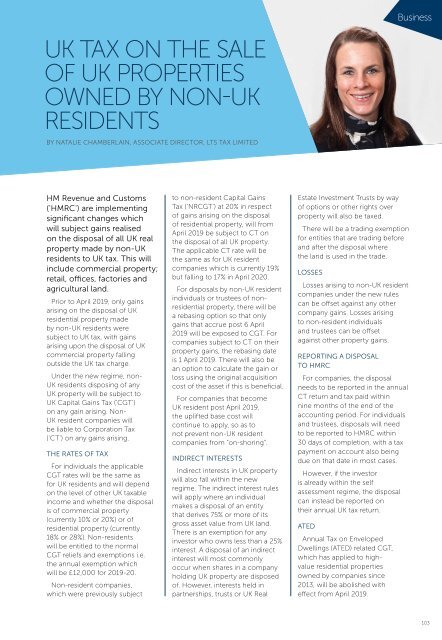En Voyage Issue#16 Flickbook
You also want an ePaper? Increase the reach of your titles
YUMPU automatically turns print PDFs into web optimized ePapers that Google loves.
Business<br />
UK TAX ON THE SALE<br />
OF UK PROPERTIES<br />
OWNED BY NON-UK<br />
RESIDENTS<br />
BY NATALIE CHAMBERLAIN, ASSOCIATE DIRECTOR, LTS TAX LIMITED<br />
HM Revenue and Customs<br />
('HMRC') are implementing<br />
significant changes which<br />
will subject gains realised<br />
on the disposal of all UK real<br />
property made by non-UK<br />
residents to UK tax. This will<br />
include commercial property;<br />
retail, offices, factories and<br />
agricultural land.<br />
Prior to April 2019, only gains<br />
arising on the disposal of UK<br />
residential property made<br />
by non-UK residents were<br />
subject to UK tax, with gains<br />
arising upon the disposal of UK<br />
commercial property falling<br />
outside the UK tax charge.<br />
Under the new regime, non-<br />
UK residents disposing of any<br />
UK property will be subject to<br />
UK Capital Gains Tax ('CGT')<br />
on any gain arising. Non-<br />
UK resident companies will<br />
be liable to Corporation Tax<br />
('CT') on any gains arising.<br />
THE RATES OF TAX<br />
For individuals the applicable<br />
CGT rates will be the same as<br />
for UK residents and will depend<br />
on the level of other UK taxable<br />
income and whether the disposal<br />
is of commercial property<br />
(currently 10% or 20%) or of<br />
residential property (currently<br />
18% or 28%). Non-residents<br />
will be entitled to the normal<br />
CGT reliefs and exemptions i.e.<br />
the annual exemption which<br />
will be £12,000 for 2019-20.<br />
Non-resident companies,<br />
which were previously subject<br />
to non-resident Capital Gains<br />
Tax ('NRCGT') at 20% in respect<br />
of gains arising on the disposal<br />
of residential property, will from<br />
April 2019 be subject to CT on<br />
the disposal of all UK property.<br />
The applicable CT rate will be<br />
the same as for UK resident<br />
companies which is currently 19%<br />
but falling to 17% in April 2020.<br />
For disposals by non-UK resident<br />
individuals or trustees of nonresidential<br />
property, there will be<br />
a rebasing option so that only<br />
gains that accrue post 6 April<br />
2019 will be exposed to CGT. For<br />
companies subject to CT on their<br />
property gains, the rebasing date<br />
is 1 April 2019. There will also be<br />
an option to calculate the gain or<br />
loss using the original acquisition<br />
cost of the asset if this is beneficial.<br />
For companies that become<br />
UK resident post April 2019,<br />
the uplifted base cost will<br />
continue to apply, so as to<br />
not prevent non-UK resident<br />
companies from “on-shoring”.<br />
INDIRECT INTERESTS<br />
Indirect interests in UK property<br />
will also fall within the new<br />
regime. The indirect interest rules<br />
will apply where an individual<br />
makes a disposal of an entity<br />
that derives 75% or more of its<br />
gross asset value from UK land.<br />
There is an exemption for any<br />
investor who owns less than a 25%<br />
interest. A disposal of an indirect<br />
interest will most commonly<br />
occur when shares in a company<br />
holding UK property are disposed<br />
of. However, interests held in<br />
partnerships, trusts or UK Real<br />
Estate Investment Trusts by way<br />
of options or other rights over<br />
property will also be taxed.<br />
There will be a trading exemption<br />
for entities that are trading before<br />
and after the disposal where<br />
the land is used in the trade.<br />
LOSSES<br />
Losses arising to non-UK resident<br />
companies under the new rules<br />
can be offset against any other<br />
company gains. Losses arising<br />
to non-resident individuals<br />
and trustees can be offset<br />
against other property gains.<br />
REPORTING A DISPOSAL<br />
TO HMRC<br />
For companies, the disposal<br />
needs to be reported in the annual<br />
CT return and tax paid within<br />
nine months of the end of the<br />
accounting period. For individuals<br />
and trustees, disposals will need<br />
to be reported to HMRC within<br />
30 days of completion, with a tax<br />
payment on account also being<br />
due on that date in most cases.<br />
However, if the investor<br />
is already within the self<br />
assessment regime, the disposal<br />
can instead be reported on<br />
their annual UK tax return.<br />
ATED<br />
Annual Tax on <strong>En</strong>veloped<br />
Dwellings (ATED) related CGT,<br />
which has applied to highvalue<br />
residential properties<br />
owned by companies since<br />
2013, will be abolished with<br />
effect from April 2019.<br />
103
















